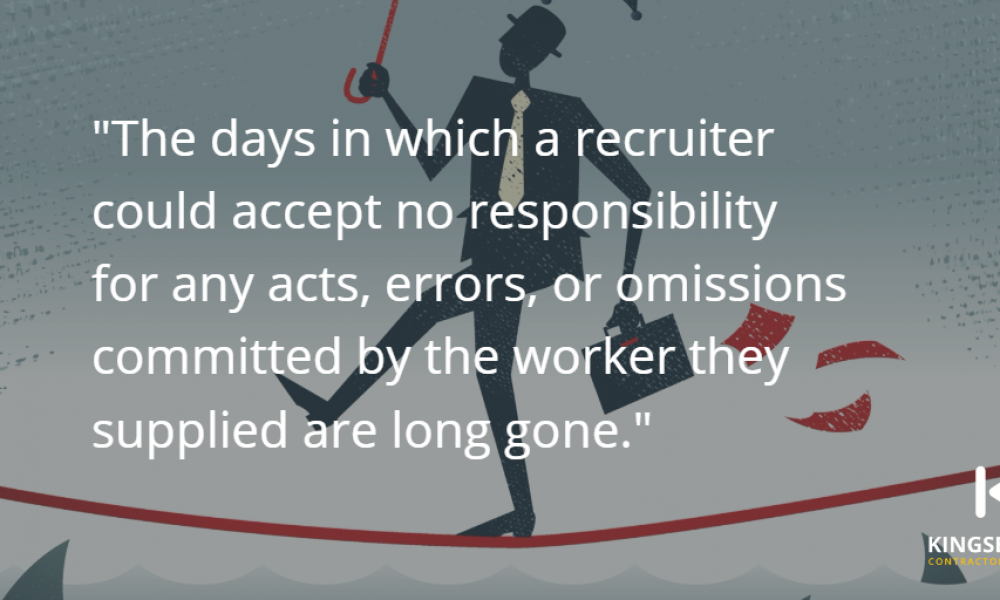How to decide which IR35 tool is best for your business
Off-payroll IR35 laws are coming into force in April, and end clients and recruiters need to act now to prepare.…
It used to be the case that once you’d found the right person for a position then your duty as…

It used to be the case that once you’d found the right person for a position then your duty as a recruiter was complete. You and your end client would move onto fulfilling the next role, but as terms become more and more onerous in the contract space there’s a few important points regarding insurance that you need to be aware of.
It’s becoming more and more common in the current climate for hirers to insist that recruiters sign contracts holding them responsible for any number of misdeeds (accidental or deliberate) perpetrated by the worker they’ve supplied. That could be anything ranging from errors and omissions, damage to the property of the hirer, injury to or caused by the worker hired, or theft of some kind.
Thomas Wynne, Head of Business Development at Kingsbridge Contractor Insurance, has seen one particular trend grow rapidly in the last few years.
Hirers are in more control than ever before in this respect. We’re seeing the standard Recruitment & Employment Confederation (REC) model terms and conditions being rejected more often than not now. The days in which a recruiter could accept no responsibility for any acts, errors, or omissions committed by the worker they supplied are long gone.
These standardised contracts, once commonplace, are becoming a thing of the past. In their place recruiters are now finding themselves having to sign non-standard contracts that the hirer places in front of them. We should be clear – recruiters still have a choice to not sign that contract. However, many are now facing two choices: sign the contract put in front of them, or see the business be taken elsewhere.
Is it unfair that a staffing company many miles away from the place where their worker is plying his or her trade is held responsible for their actions just because it supplied them? Undoubtedly. But we must remember that, whether fair or not, that is the exact legal position.
Many recruiters are more focused on delivering the best candidates for their clients and hitting their targets, and rightly so. We understand that looking through the finer details of lengthy contracts may not seem like the best use of your time, but it’s imperative that you know where you stand. Stuart Armstrong, recruitment industry specialist at Kingsbridge Insurance Brokers, backed up this point, noting:
The responsibility lies with the recruiter. From a legal standpoint they are seen as the contracting party with the client, and it is that client who makes them responsible. If the hirer is facing a scenario where they are likely to get sued or they are unhappy with a piece of work, then their main aim is going to be passing that straight back down the line and back into the lap of the recruiter.
Having the correct insurance in place should give the recruiter the confidence to sign terms they maybe otherwise wouldn’t. Before agreeing to the terms put before you by the hirer, you must ensure that your own insurance policy is adequate and watertight, and that all the liabilities being outlined by the hirer are being picked up.
It’s also imperative that you discuss those terms with your insurance broker, both for your own peace of mind and to make sure that you are still covered if the contract you’re signing falls outside of the standardised REC model.
As the terms have become more onerous some recruiters have begun insisting on proof insurance from their contractor candidates prior to placement to reduce their risk, but in the last twelve months hirers are starting to specifically insist on this happening. Thomas Wynne notes:
We are starting to see scenarios whereby the hirer is requiring the PSC contractor to have their own separate insurance, often to the extent that it becomes a condition for getting the client’s business. Problems arise when the recruiter doesn’t check whether the worker they’re placing has the appropriate insurance cover, leaving themselves open to the possibility of having to deal with a claim from the hirer.
Recruiters must remember that it is their name on the contract when it comes to supplying workers, and that in the first instance the hirer will come after them. In such circumstances, they are either going to have to deal with the costs of the claim, or have great confidence that the contracted worker they supplied has purchased compliant and comprehensive insurance cover.
Many recruiters run a list of preferred suppliers for accountancy and umbrella service providers in order to ensure their contractors’ affairs are managed compliantly at all times; but many do not have an insurance partner ready to help manage the risk which arises from placing contractors.
Kingsbridge act as that partner to hundreds of recruitment businesses. With a clear understanding of the marketplace, the nature of engaging workers and the sectors in which those workers operate, Kingsbridge can offer cost effective products for all recruitment companies and contractors.
Given the amount of other compliance issues the recruitment industry is facing, it’s good to know that one area of increasing uncertainty can be dealt with swiftly and securely, leaving recruiters able to increase their business without increasing their risk.
To discuss insurance requirements for your business, contact Kingsbridge.